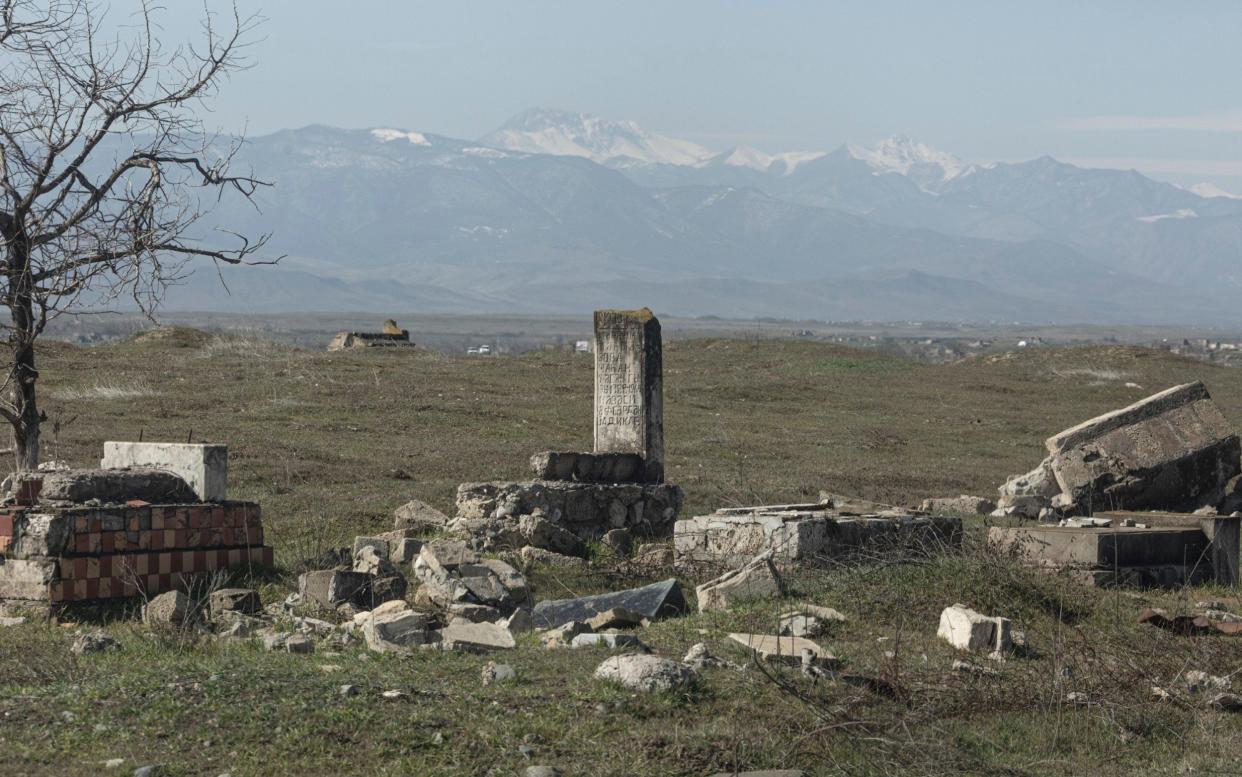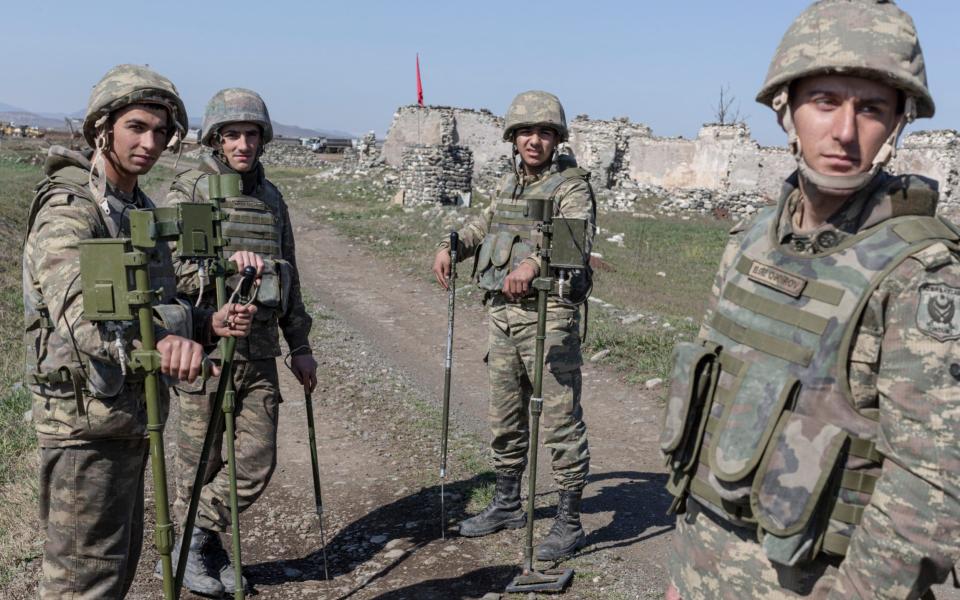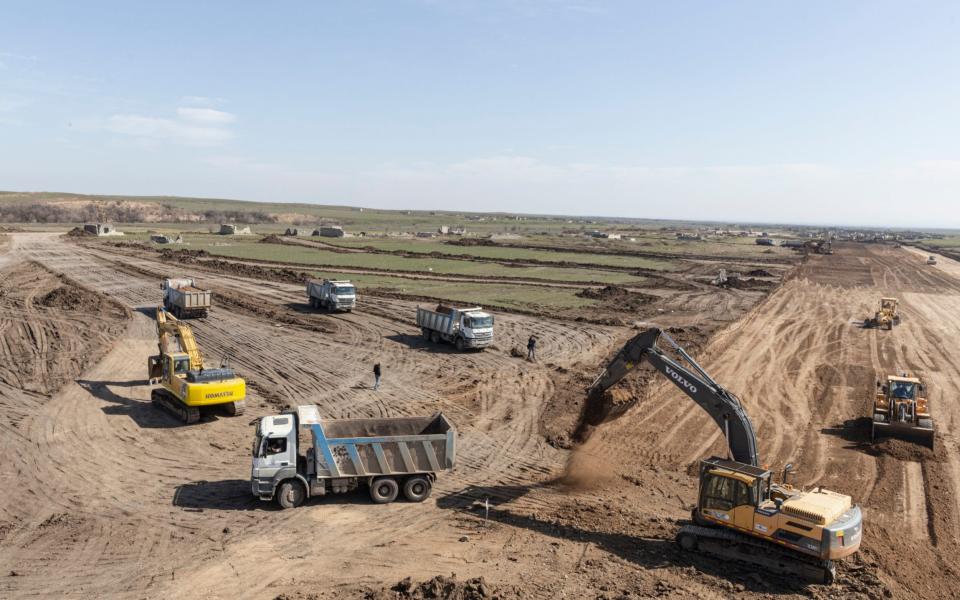'They want to see the land before they die': Azerbaijanis eager to return to Nagorno-Karabakh

Habib Mamadov was sanguine after being informed he would not be seeing the ruins of his childhood home on Saturday.
A 42-year-old Azerbaijani public servant, Mr Mamadov had accompanied a government-organised press trip to territories retaken by Azerbaijan following the recent war with Armenian forces over the enclave of Nagorno-Karabakh.
Mr Mamadov had hoped the tightly controlled group could visit Agdam, a town he last saw as a fleeing 14-year-old and which has now been entirely destroyed.
Following a change of itinerary though, Mr Mamadov decided that after waiting for 27 years, another few months would not make a difference.
“But for older people it’s different,” he said, standing next to an under-construction electricity substation in Fuzuli, a regained territory south of Nagorno-Karabakh. “They are waiting impatiently, they want to see the land before they die.”

During the first Nagorno-Karabakh war fought amid the collapse of the Soviet Empire in 1988 to 1994, Armenian secessionists gained control of the historically Armenian-majority territory of Nagorno-Karabakh and seven surrounding Azerbaijani-majority districts.
Azerbaijan never accepted the outcome, and in September last year, President lham Aliyev launched an offensive to retake the regions, sparking a second war that ended in November with a Russia-brokered ceasefire.
Turkish military support for Azerbaijan proved decisive and the outcome drastically altered the score, with Armenian forces compelled to surrender large chunks of Nagorno-Karabakh and the territory surrounding it.
Now, many of the 700,000 Azerbaijanis who were displaced during the first war are eagerly waiting for de-mining work to finish so they can return to see the ruins of their former homes.
“It’s where I was born and where I grew up,” Mr Mamadov said, explaining his motivation to return. “All my ancestors were living there for centuries. This is where I belong to, this is reason enough I think.”
Mr Mamdov described how six years in limbo in a displacement camp had produced a simmering resentment that remained with him while he studied abroad, throughout his diplomatic postings and during his career as a bureaucrat in Baku.
“When you are not where you belong to, you feel like you are incomplete,” he said. “It’s a kind of trauma, thinking about Armenians, it’s natural, it’s not controllable, this hatred, created inside.”

It was sentiments like these that kept this so-called "frozen conflict" festering for more than 20 years.
Following the 1994 ceasefire skirmishing flared up on an almost annual basis, and tortuous peace talks brokered by the Organisation for Security and Cooperation in Europe failed to produce a peace treaty.
President Aliyev claimed in a press conference on Friday that he had resorted to war last September only as a last resort. “We were in the process of negotiations as long as we had hopes for that,” he said. “When we really realised this was not possible… our response was final.”
If the trauma of war stopped time for Mr Mamadov, it also froze the landscape of many of the territories that were under Armenian control.
Located in military zones, and held as bargaining chips, many of these lands have lain fallow since the first war ended in May 1994. Areas that once grew cotton and supported Soviet-era vineyards are today wastelands, with only the skeletal remains of buildings indicating where villages once stood.
Agdam, once home to nearly 30,000 people, was so damaged by fighting and systematic looting that Azerbaijanis refer to it as the Hiroshima of the Caucasus.

Rebuilding will be a monumental task and the government is now rushing to establish infrastructure to support a returning population, budgeting about £1.4 billion in 2021 for reconstruction in the newly retaken territories, with similar investments expected to continue for years, according to President Aliyev.
In Fuzuli, an international airport is rapidly taking shape on the ruins of a long-abandoned town. Since ground was broken on January 14, military de-mining teams have barely kept ahead of the dozens of earth-movers laying the 3,000 metre runway, which officials say will be completed by August.
“Now that we’ve restored our territory, we are starting with the development of transport infrastructure,” said Ferhan Boliyev, an Azerbaijan Airlines official, who spoke over a symphony of roaring graders.
From Fuzili, a 63-mile multi-lane highway is being built to the key city of Shusha, which was retaken by Azerbaijan forces during the recent fighting. New electricity pylons already line the route, now renamed Victory Road. Engineers plan to finish by the middle of next year.
While the recent 44-day war produced a victory for Azerbaijan, for ethnic Armenians, there was no such resolution.
Mets Tagher or Böyük Tağlar, a village of tidy tin-roofed homes clustered around an ancient-looking church on a snow-dusted hillside, had been held by Armenian forces since the first war.
The Armenian-majority settlement lies in a part of the foothills of Nagorno-Karabakh that Azerbaijan regained following November's ceasefire agreement.
It is now abandoned. Fluttering Azerbaijani flags newly hung on buildings are the only thing moving in the village. In one yard, a Spiderman figurine clung to a fence, awaiting a boy who will likely never return.
Armenian officials in Nagorno-Karabakh have said the recent war displaced more than half the population of the breakaway territory, or about 90,000 people. An estimated 300,000-500,000 Armenians were also displaced in the first war.
Most are unlikely to return to areas now under Azerbaijani control.
Azerbaijani officials say full rights awaits those who accept Azerbaijani citizenship, but this is something few ethnic Armenians are willing to do.
Officials say Azerbaijan is a multi-ethnic state and say there are already 30,000 Armenians living in the country (out of a population of 10 million).
But the rights on offer do not include recognition of Armenian as an official language, though officials say people are free to speak it and that education is available in Russian as well as Azerbaijani.

“They can announce Swahili as an official language [in Nagorno-Karabakh], it doesn’t make any difference,” President Aliyev told Friday’s press conference. “The official language in Azerbaijan is Azerbaijani and no other language has that status.”
But anti-Armenian sentiment is widespread throughout the country, whose rights record has been criticised by human rights groups. Freedom House in its 2020 report rated the country as "not free" and accused authorities of an "extensive crackdown on civil liberties in recent years, leaving little room for independent expression or activism."
Many Azerbaijanis meanwhile express disinterest in the fate of those Armenians displaced in the recent fighting. “The Armenians, they ran away from here,” a government guide said with a shrug when asked about the inhabitants of Mets Tagher.
Mr Mamadov though seemed ill at ease when considering displaced Armenians who, like he had once done, are now living lives in which time has been halted by trauma.
“For us it is all over, it’s finished,” he said. “But I think they are not ready for peace.”

 Yahoo News
Yahoo News 
